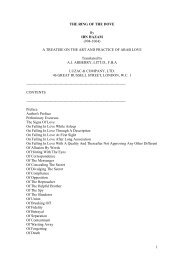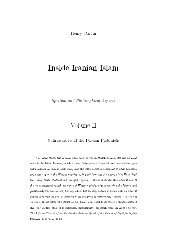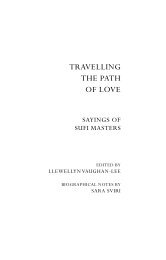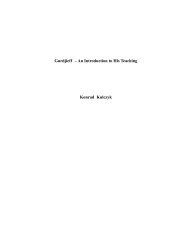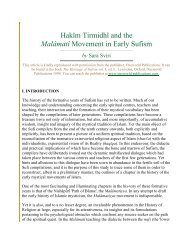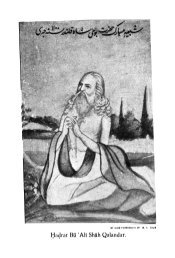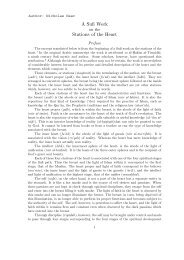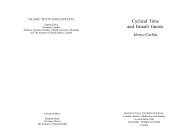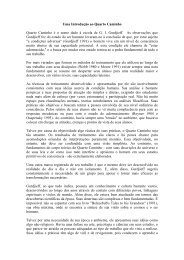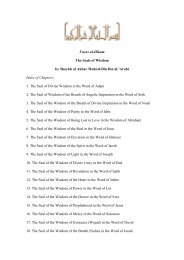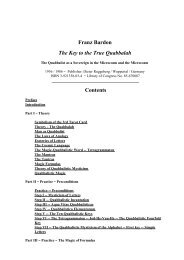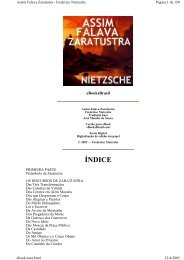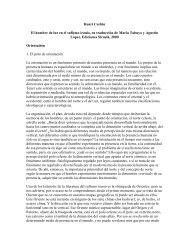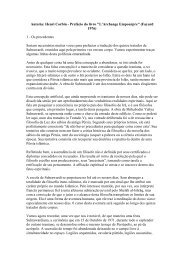Temple and Contemplation brings together for the first ... - ImagoMundi
Temple and Contemplation brings together for the first ... - ImagoMundi
Temple and Contemplation brings together for the first ... - ImagoMundi
You also want an ePaper? Increase the reach of your titles
YUMPU automatically turns print PDFs into web optimized ePapers that Google loves.
i<br />
THE IMAGO TEMPLI IN CONFRONTATION<br />
<strong>and</strong> our space. It is not to be confused, <strong>the</strong>re<strong>for</strong>e, with <strong>the</strong> second <strong>Temple</strong>,<br />
built by Zerubbabel in 515 B.C.<br />
2. God himself as <strong>the</strong> <strong>Temple</strong>. The promise of <strong>the</strong> new <strong>Temple</strong> arises out of<br />
<strong>the</strong> very abyss of its destruction; <strong>for</strong>, if that destruction were definitive, it<br />
would no longer give rise to anything but what goes today by <strong>the</strong> name of<br />
"<strong>the</strong> <strong>the</strong>ology of <strong>the</strong> death of God". The <strong>the</strong>ology of <strong>the</strong> <strong>Temple</strong> can never<br />
accept such a death. The promise of <strong>the</strong> New <strong>Temple</strong> comes not from a<br />
<strong>the</strong>ology of <strong>the</strong> death of God, but from a <strong>the</strong>ology of exile; <strong>and</strong> this inspires<br />
a motif in Ezekiel which anticipates <strong>the</strong> most elevated intuitions of spirituality.<br />
In this <strong>the</strong>ology of exile it is God himself who becomes <strong>the</strong> temple<br />
of his faithful; <strong>for</strong> <strong>the</strong>re were some who sighed <strong>and</strong> groaned because of <strong>the</strong><br />
profanation of <strong>the</strong> <strong>Temple</strong> (Ezek. 9:8). These are "<strong>the</strong> remnant of Israel",<br />
<strong>the</strong> last righteous men. The Angel-scribe was ordered to "set a mark upon<br />
[<strong>the</strong>ir] <strong>for</strong>eheads" (Ezek. 9:4), as a guarantee of immunity <strong>and</strong> protection.<br />
To all <strong>the</strong> o<strong>the</strong>rs <strong>the</strong> Eternal can say, "I will profane my sanctuary, <strong>the</strong><br />
excellency of your strength, <strong>the</strong> desire of your eyes" (Ezek. 24:21), <strong>for</strong> <strong>the</strong><br />
love of such as <strong>the</strong>se <strong>for</strong> <strong>the</strong>ir temple is no more than superstition. But <strong>the</strong><br />
divine Presence which has deserted <strong>the</strong> <strong>Temple</strong> will remain in <strong>the</strong> country<br />
of exile among <strong>the</strong> exiles. "Again <strong>the</strong> word of <strong>the</strong> Lord came unto me,<br />
saying, Son of man, thy brethren, even thy brethren, <strong>the</strong> men of thy<br />
kindred, <strong>and</strong> all <strong>the</strong> house of Israel wholly, are <strong>the</strong>y . .". Although I have<br />
cast <strong>the</strong>m far off among- <strong>the</strong> heaven, <strong>and</strong> although I have scattered <strong>the</strong>m<br />
among <strong>the</strong> countries, yet will I be to <strong>the</strong>m as a little sanctuary in <strong>the</strong> countries<br />
where <strong>the</strong>y shall come" (Ezek. 11:14—16).<br />
So <strong>the</strong>re is a promise of a divine Presence in <strong>the</strong> countries of exile. 45<br />
Those who are exiled, who have received <strong>the</strong> mark of <strong>the</strong> Angel on <strong>the</strong>ir<br />
<strong>for</strong>eheads, are <strong>the</strong> true heirs of Israel. God is identified with <strong>the</strong> <strong>Temple</strong>.<br />
The <strong>Temple</strong> on <strong>the</strong> earth of exile is only temporary. God is not, of course,<br />
identified with <strong>the</strong> physical building; ra<strong>the</strong>r, it is <strong>the</strong> idea of <strong>the</strong> spiritual<br />
<strong>Temple</strong> which is heralded by <strong>the</strong> prophet Ezekiel <strong>and</strong> which will be<br />
realized in <strong>the</strong> Community of Qumran. The spiritual <strong>Temple</strong> is <strong>the</strong><br />
establishment of a spiritual <strong>and</strong> personal bond between Yahveh <strong>and</strong> his<br />
people: "And <strong>the</strong>y shall be my people, <strong>and</strong> I will be <strong>the</strong>ir God" (Ezek.<br />
11:20). This spiritual proximity is in no way hindered by spatial distance<br />
45 For what follows, see Shozo Fujita, op. cit., pp. 34-43.<br />
286<br />
THE IMAGO TEMPLI IN CONFRONTATION<br />
or by dispersion into <strong>the</strong> countries of exile, <strong>for</strong> it signifies <strong>the</strong> habitation of<br />
<strong>the</strong> Torah in <strong>the</strong> heart through <strong>the</strong> heart's renewal: "... make you a new<br />
heart <strong>and</strong> a new spirit: <strong>for</strong> why will ye die, O house of Israel? For I have<br />
no pleasure in <strong>the</strong> death of him that dieth, saith <strong>the</strong> Lord God: where<strong>for</strong>e<br />
turn yourselves, <strong>and</strong> live ye" (Ezek. 18:31-32).<br />
Even more than <strong>the</strong> Torah, it is God himself who dwells in <strong>the</strong> heart:<br />
"... yet will I be to <strong>the</strong>m as a little sanctuary". God himself is <strong>the</strong><br />
spiritual <strong>Temple</strong> that dwells with <strong>the</strong> exiles. 46 There is a conjunction<br />
between <strong>the</strong> renewal of <strong>the</strong> human heart <strong>and</strong> <strong>the</strong> establishment of <strong>the</strong> new<br />
<strong>Temple</strong> that, as a spiritual <strong>Temple</strong>, presages <strong>and</strong> heralds <strong>the</strong> spiritual<br />
worship that a spiritual Israel will offer up to God "upon a very high<br />
mountain" (Ezek. 40:2). This is <strong>the</strong> perfect Imago Templi: <strong>the</strong> spiritual<br />
<strong>Temple</strong> as <strong>the</strong> place where spiritual worship is celebrated.<br />
The Glory of Yahveh has departed from Jerusalem <strong>and</strong> dwells among<br />
<strong>the</strong> exiles, in Babylon or o<strong>the</strong>r places. Yahveh has become <strong>the</strong> spiritualized<br />
<strong>Temple</strong>, but he has none<strong>the</strong>less promised that when he returns to <strong>the</strong> new<br />
<strong>Temple</strong> where he will dwell <strong>for</strong>ever, he will restore <strong>the</strong> Glory to it. This is<br />
a new phase in <strong>the</strong> templar <strong>the</strong>ology of Ezekiel.<br />
3. The return of <strong>the</strong> Shekhinah. As we have already observed, <strong>the</strong> destruction<br />
began with <strong>the</strong> <strong>Temple</strong> <strong>and</strong> with <strong>the</strong> departure from it of <strong>the</strong> Shekhinah or<br />
Glory. Similarly, <strong>the</strong> restoration begins with <strong>the</strong> <strong>Temple</strong> <strong>and</strong> is <strong>the</strong> return<br />
of <strong>the</strong> Glory of <strong>the</strong> Lord to <strong>the</strong> new <strong>Temple</strong>. 47 "And <strong>the</strong> glory of <strong>the</strong> Lord<br />
came into <strong>the</strong> house by <strong>the</strong> way of <strong>the</strong> gate whose prospect is towards <strong>the</strong><br />
cast" (Ezek. 43:4). As <strong>the</strong> Glory, carried by <strong>the</strong> Cherubim, had withdrawn<br />
l>y <strong>the</strong> <strong>Temple</strong>'s eastern gate (Ezek. 10:18-19; II- 23), so on its return it<br />
enters <strong>the</strong> <strong>Temple</strong> by way of <strong>the</strong> eastern gate. Now ". . . behold, waters<br />
issued out from under <strong>the</strong> threshold of <strong>the</strong> house eastward: <strong>for</strong> <strong>the</strong> <strong>for</strong>efront of<br />
<strong>the</strong> house stood toward <strong>the</strong> east, <strong>and</strong> <strong>the</strong> waters came down from under from<br />
46. This verse from Ezekiel (11:16) allows us to be specific about what we should<br />
underst<strong>and</strong> by "spiritualization" of <strong>the</strong> <strong>Temple</strong>. We will return to this later (see<br />
below, note 121). Here, Shozo Fujita (p. 41, note 1) tells us: "An object can be said to<br />
be spiritualized when it is interpreted in accordance with some predominant <strong>the</strong>ological<br />
or religious concept. The adjective spiritual describes a state or an action<br />
which is attributed to <strong>the</strong> Spirit of God or to <strong>the</strong> human spirit as opposed to <strong>the</strong><br />
flesh. It is also used as a synonym <strong>for</strong> <strong>the</strong> word spiritualized. In this dissertation, <strong>the</strong><br />
word spiritual has been used in <strong>the</strong> <strong>first</strong> sense, but it is used here in <strong>the</strong> second<br />
sense."<br />
17 Shozo Fujita, op. cit., pp. 44-69.<br />
287



